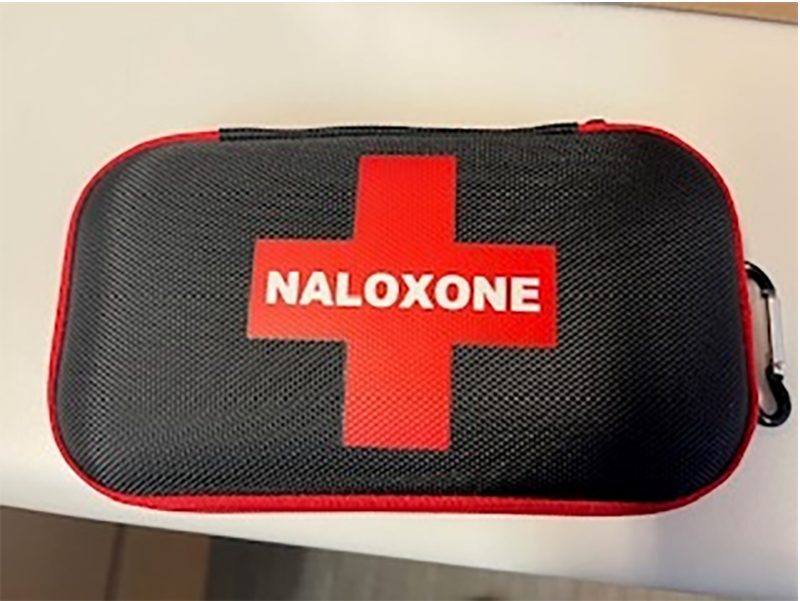
Naloxone kit. Photo Credit: Hastings Prince Edward Public Health
By: Jessyka Maliksi
BELLEVILLE – Emergency department visits in Hasting Prince Edward counties almost doubled in 2023 compared to the year before due to opioid-related poisonings.
There were three times as many anonymous reported overdoses in 2023 compared to the prior year.
The number of opioid-related calls to the Hastings Quinte Paramedic Services increased by 200 from 2023 to 2022.
Those are significant numbers found on the Hastings Prince Edward Public Health Monitoring Dashboard.
The obstacle this region is facing regarding drugs is the unregulated illicit drug supply, said Stephanie McFaul the sexual health and harm reeducation program manager at Hasting Prince Edward Public Health.
“The challenge that we’re seeing is that people think they’re buying one thing, and those drugs may be contaminated with other drugs,” said McFaul.
This toxic drug supply is what’s contributing to the increase in opioid poisonings, leading to overdose and sometimes death.
McFaul said there is no way of knowing what is in each of the drugs people are buying off the street.
People take drugs for many different reasons. McFaul said some of those reasons could be to numb themselves or because they’re starting prescription drugs and eventually become dependent on them.
November 2023 saw the highest amount of opioid-related calls at 64, which is almost a 300% increase from the month before.
According to McFaul, there was an incident that happened in early November where an unknown batch of drugs came into the community and was distributed to drug users. These new drugs resulted led to many users to experiencing drug poisoning leading to an increase in hospital visits and calls.
The Hasting Prince Edward Public Health department finds itself as an important member of community response to help cut the number of opioid-related incidents in the region.
McFaul told QNet News that the health unit offers many programs and services to those who need it.
They are a part of the harm reduction alliance in the community and offer harm reduction services which gives access to safer drug use supplies to help prevent the spread of blood borne infections.
McFaul said when there’s a dangerous batch of drugs going around in the community, and their partners start to see an increase in calls regarding drug poisonings, the health unit works together to give out early warning signs to the individuals who use drugs.
“We have all these mechanism in place where the health unit will do our very best to take whatever early information is available, and then put out media release and put out alerts to community partners,” said McFaul “And try to connect with individuals who use drugs to give them that heads up, and give them the warning to be aware that there might be some bad batch of drugs circulating.”
They call this process their early warning systems.
The health unit also works with community partners to provide and train people on Naloxone kit uses for those who need it.
“We see that this opioid crisis is not going away,” said McFaul “So, one of our tools that we have is to try to equip people with having access to Naloxone.”
The public health unit is aware that these kits may not work in every situation, but they are making it their objective to make sure that Naloxone is available to anyone who needs it.
They also work with the school board on their school health program, where there are school nurses and health promoters that support individuals going through challenges and their programs.
The Hastings Prince Edward Public Health unit also uses the Opioid Monitoring Dashboard to collect recent data to share and update the community on the opioid crisis. This helps them monitor what is going on and work with partners to come up with solutions.
“We continue to work with our community partners on what else needs to be done. How do we approach this opioid crisis as a community? What other support, what other programs need to be put in place?” said McFaul.
She said this helps continue the conversation on what needs to be done to help prevent these situations from happening again.
“There isn’t one particular solution,” said McFaul.
“But, I think what we need to continue to do as a community, is we need to support people who are using drugs,” said McFaul.
She said the solution is in the community agencies by asking drug users the right questions and providing them with the support they need.
Audio Player
 Print This Post
Print This Post






